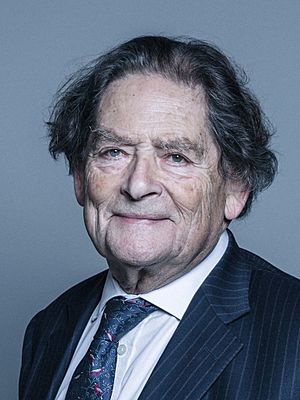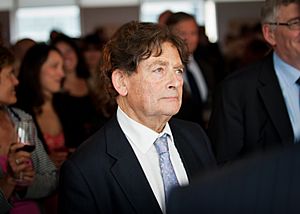Nigel Lawson facts for kids
Quick facts for kids
The Lord Lawson of Blaby
|
|
|---|---|

Official portrait, 2018
|
|
| Chancellor of the Exchequer | |
| In office 11 June 1983 – 26 October 1989 |
|
| Prime Minister | Margaret Thatcher |
| Preceded by | Geoffrey Howe |
| Succeeded by | John Major |
| Secretary of State for Energy | |
| In office 14 September 1981 – 11 June 1983 |
|
| Prime Minister | Margaret Thatcher |
| Preceded by | David Howell |
| Succeeded by | Peter Walker |
| Financial Secretary to the Treasury | |
| In office 4 May 1979 – 14 September 1981 |
|
| Prime Minister | Margaret Thatcher |
| Preceded by | Robert Sheldon |
| Succeeded by | Nicholas Ridley |
| Member of the House of Lords Lord Temporal |
|
| In office 6 July 1992 – 31 December 2022 Life peerage |
|
| Member of Parliament for Blaby |
|
| In office 28 February 1974 – 16 March 1992 |
|
| Preceded by | Constituency created |
| Succeeded by | Andrew Robathan |
| Personal details | |
| Born | 11 March 1932 Hampstead, London, England |
| Died | c. 3 April 2023 (aged 91) |
| Political party | Conservative |
| Spouses |
|
| Children | 6, including Dominic and Nigella |
| Education | Westminster School |
| Alma mater | Christ Church, Oxford |
| Military service | |
| Allegiance | United Kingdom |
| Branch/service | Royal Navy |
Nigel Lawson, Baron Lawson of Blaby (born 11 March 1932 – died 3 April 2023) was an important British politician and journalist. He was a member of the Conservative Party. He served as a Member of Parliament (MP) for Blaby from 1974 to 1992.
Lawson was a key minister in Margaret Thatcher's government from 1981 to 1989. He started as the Financial Secretary to the Treasury in 1979. Later, he became the Secretary of State for Energy in 1981. His most important role was Chancellor of the Exchequer from 1983 to 1989. As Chancellor, he was in charge of the UK's money and economy. He strongly supported Thatcher's idea of selling off state-owned companies, known as privatisation.
After leaving the government, Lawson continued to be active in politics. He became a member of the House of Lords in 1992. He was a strong supporter of Britain leaving the European Union. He also led a group called The Global Warming Policy Foundation. Nigel Lawson had six children, including the famous food writer Nigella Lawson and journalist Dominic Lawson.
Contents
Early Life and Education
Nigel Lawson was born in Hampstead, London, on 11 March 1932. His family was Jewish. His father, Ralph Lawson, owned a tea-trading business. His mother, Joan Elizabeth, came from a family of stockbrokers. Nigel's grandfather, Gustav Leibson, changed the family name to Lawson in 1925.
Nigel went to Westminster School in London. He then studied at Christ Church, Oxford University. He earned a top degree in philosophy, politics, and economics.
Life and Career
Lawson served in the Royal Navy as an officer. He commanded a fast boat called HMS Gay Charger.
He started his career as a journalist in 1956 at the Financial Times. He later became the City editor of The Sunday Telegraph in 1961. From 1966 to 1970, he was the editor of The Spectator magazine.
Early Political Career
Lawson first tried to become an MP in 1970 but did not win. He was elected as the MP for Blaby in February 1974. He held this seat until he retired in 1992.
When the Conservative Party was not in power, Lawson worked with other MPs. They helped pass a law to automatically adjust tax levels. This stopped inflation from increasing the tax burden on people.
In Government
Financial Secretary to the Treasury
In 1979, when Margaret Thatcher became Prime Minister, Lawson was made Financial Secretary to the Treasury. This was an important role in the UK's money department. He worked hard to change things. He ended government controls on mortgage lending. He also removed rules about exchanging money with other countries. He published a plan for the government's economic policy.
Secretary of State for Energy
In 1981, Lawson was promoted to Secretary of State for Energy. In this job, he prepared for a possible strike in the coal industry. He believed some coal mines were losing too much money and needed to close. He was a strong supporter of privatising (selling off) state-owned industries. During his time, he planned for the future sale of gas and electricity companies. Later, he helped privatise British Airways, British Telecom, and British Gas.
Chancellor of the Exchequer
"[A] mixture of free markets, financial discipline, firm control over public expenditure, tax cuts, nationalism, "Victorian values" (of the Samuel Smiles self-help variety), privatisation and a dash of populism."
After the Conservatives won the 1983 election, Lawson became Chancellor of the Exchequer. This meant he was in charge of the country's money. He worked on changing the tax system. In 1984, he reformed taxes for companies. In 1985, he reduced National Insurance payments for lower earners. He also expanded VAT.
From 1986, Lawson started to cut Income tax. This made him more popular as unemployment began to fall. He also changed the country's budget. It went from a deficit (spending more than it earned) to a surplus (earning more than it spent). The basic tax rate was cut from 30% to 25%. The highest tax rate was cut from 60% to 40%.
In 1986, major changes happened in London's financial markets. This was called the "Big Bang". It made it easier for banks to operate. Lawson later said this change accidentally led to the financial crisis of 2007–2008.
The UK economy grew very fast during this time. This period was called the "Lawson Boom". Unemployment was cut in half by 1989. However, prices (inflation) also rose quickly. This led to higher interest rates.
Lawson did not agree with the new "poll tax" which replaced local taxes. He shared his concerns within the government, but his ideas were not accepted.
Lawson and Prime Minister Thatcher had disagreements about economic policy. This led to his resignation in October 1989. He was replaced by John Major. Lawson was Chancellor for six years, which was a long time.
Retirement
After leaving government, Lawson decided to lose weight. He wrote a best-selling book called The Nigel Lawson Diet Book.
In 1992, he was given the title Baron Lawson of Blaby. This meant he could sit in the House of Lords as a life peer.
He sometimes appeared on TV shows, including his daughter Nigella's cooking programmes.
In 2013, Lawson spoke out for Britain leaving the European Union. He believed it would be good for the economy. He supported the "Vote Leave" campaign in the 2016 EU referendum.
Corporate Roles
- 2007: Chairman of Central Europe Trust Company Ltd (CET)
- 2007: Chairman of Oxford Investment Partners
Position on Global Warming
Nigel Lawson was involved in discussions about climate change. He believed that the effects of human-caused global warming were often overstated.
In 2004, he wrote a letter to The Times newspaper. He said there were many scientific questions about climate change. In 2005, he was part of a committee in the House of Lords that looked into climate change. Their report suggested that the UK government should be more involved in climate policy.
In 2008, Lawson published a book called An Appeal to Reason: A Cool Look at Global Warming. In the book, he argued that while global warming is happening, its effects would not be as bad as some people predicted. He criticised politicians and scientists who he felt were too "alarmist".
In 2009, Lawson became the chairman of a new group called The Global Warming Policy Foundation. This group aimed to educate people about climate change.
In the Media
Lawson was interviewed for TV documentaries about Thatcherism. He also appeared on radio shows to discuss banking reform. In 2010, he talked about how the "Big Bang" in 1986 led to investment banks mixing with high street banks. He said this put people's savings at risk.
Personal Life and Death
Nigel Lawson was married twice and had six children.
- With Vanessa Salmon (married 1955; divorced 1980):
- Dominic (born 1956), a journalist.
- Nigella (born 1960), a famous cook and author.
- Thomasina (1961–1993).
- Horatia (born 1966).
- With Thérèse Maclear (married 1980; divorced 2012):
- Tom (born 1976), who became a headmaster.
- Emily (born 1981), a television producer.
Nigel Lawson passed away on 3 April 2023, at the age of 91.
See also
 In Spanish: Nigel Lawson para niños
In Spanish: Nigel Lawson para niños
 | Selma Burke |
 | Pauline Powell Burns |
 | Frederick J. Brown |
 | Robert Blackburn |


